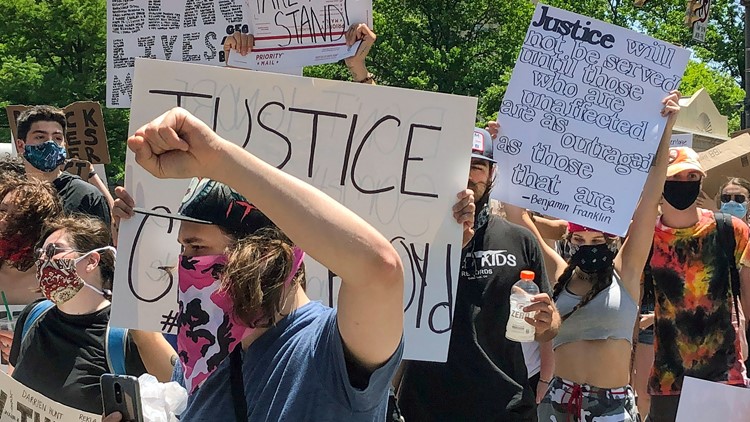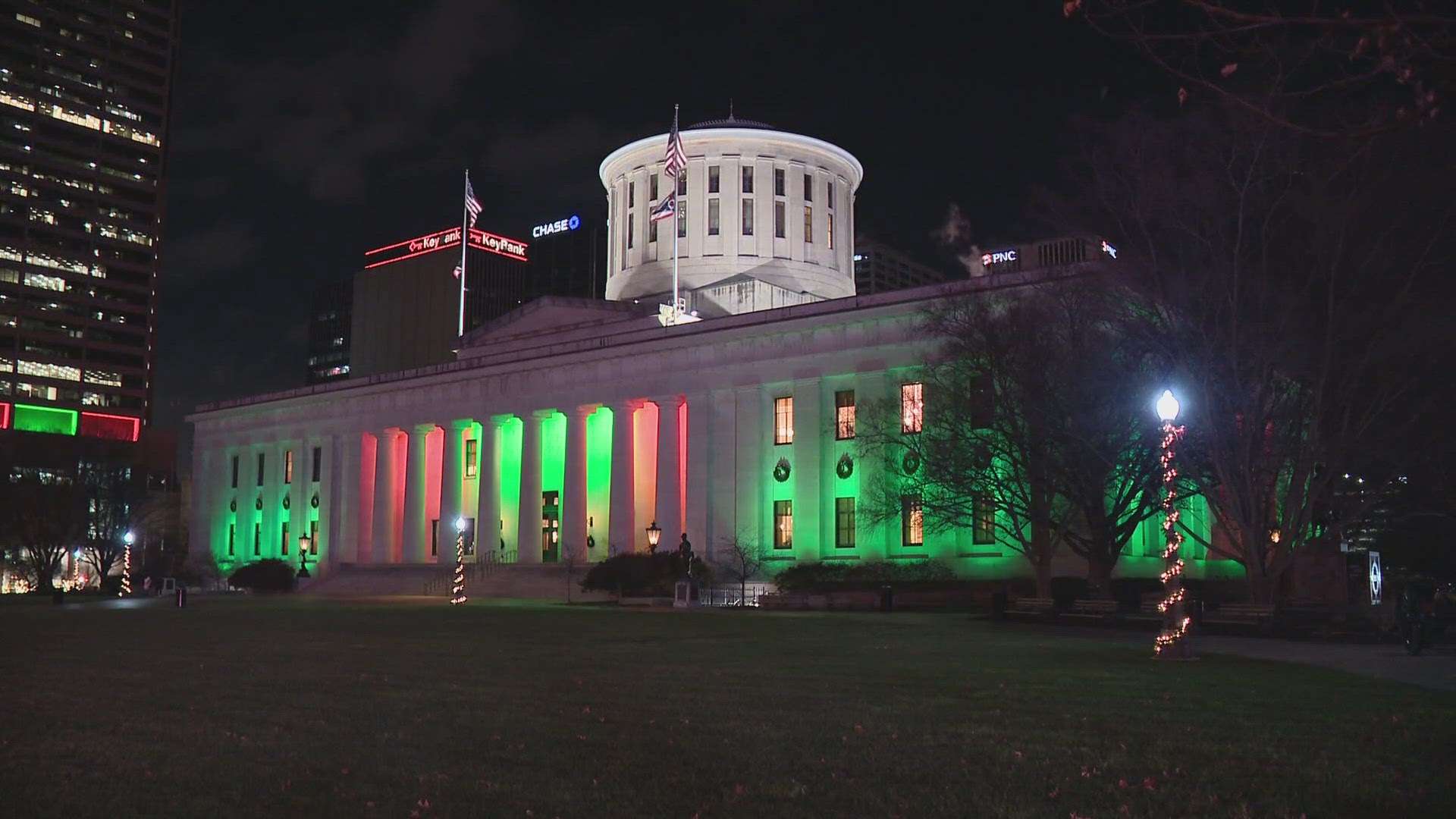COLUMBUS, Ohio — An Ohio House committee passed legislation Wednesday that would amplify criminal penalties against people who attend protests that devolve into what the law considers a “riot.”
House Bill 109 is one of several pieces of legislation written in response to protests that formed in the summer of 2020. They occurred after footage captured a Minneapolis police officer killing George Floyd, an unarmed Black man, with the officer’s knee choking off Floyd’s neck over the course of about 9 minutes. Massive protests formed nationwide in response. The vast majority were peaceful, though some of the earliest demonstrations (an estimated 6% nationally) turned chaotic and destructive.
While some states responded to the murder of Floyd by enacting various police reform proposals, Ohio and some other conservative states have instead targeted the protests that formed in response.
Lobby groups representing prosecutors and police offered support for HB 109, arguing it protects officers in unlawful and fraught situations; the ACLU and civil justice activists oppose it, insisting it’s a racially coded means to chill free speech.
The legislation:
- Creates new criminal offenses including “riot assault,” a felony; “riot vandalism,” a felony; “harassment in a place of public accommodation,” a misdemeanor; and “bias motivated intimidation,” a felony. It also increases existing criminal penalties for offenses including rioting, aggravated rioting, disorderly conduct, and vandalism.
- Expands the scope of some of these offenses. For instance, “disorderly conduct” is a minor-misdemeanor offense that doesn’t warrant jail time, according to bill analysis from the state Legislative Service Commission. But if the violation occurs during a “riot,” that becomes a fourth-degree felony (six to 18 months). Offending acts would include blocking public roads or highways “to interfere with the rights of others” at a protest or demonstration of which no permit was issued.
- Broadens the offense of “corrupt activity” to include people or entities who knowingly provide “material support or resources” with purpose that they be used to “plan, prepare, carry out or aid” in a riot.
- Allows police officers to sue alleged rioters, those who provide rioters with “material support,” or those who file a knowingly false “complaint” against an officer (the bill doesn’t specify what counts as a complaint).
While lawmakers passed the bill via a roll call vote along party lines, social justice activists in the crowd wearing coronavirus masks adorned with red “X”es across them stood up in protest while holding “protect free speech” signs.
Joan Van Becelaere, a former pastor who organized the demonstration, said the legislation is loaded with “dog whistle” language that targets racial justice demonstrators.
“It’s really obvious in the whole thing and how vague it is, that it’s trying to chill out any protest that they don’t like,” she said. “And this grew out of the protest that were taking place in the streets right after George Floyd was murdered.”
The bill is sponsored by Reps. Sara Carruthers, R-Hamilton, and Cindy Abrams, R-Harrison Twp. Sixteen other Republicans signed on as cosponsors. In an interview, Abrams denied any claim that the legislation is racially coded. She acknowledged that most the underlying conduct in the bill is already illegal but noted it didn’t stop people from causing an estimated $158,000 in damage to the Ohio Statehouse last summer after Floyd died.
“When you make the conscious choice to pick up the brick and throw it at a police officer or make that conscious choice to pick up the brick and throw it into the small business window, shatter it, loot the business and catch it on fire, that’s where it’s not a peaceful protest anymore,” she said.
Michael Weinman, a lobbyist for the Fraternal Order of Police union, told lawmakers the legislation is needed given how police officers were pilloried after Floyd’s murder and the subsequent protests.
“Complaints against officers became more weaponized during the protests/riots over the spring and summer of 2020,” he said via written testimony. “Scores of complaints were only intended to harass and intimidate officers.”
Rep. Thomas West, D-Canton, said Wednesday he sees the legislation as racially coded. As President of the Ohio Legislative Black Caucus, he issued a statement criticizing the “anti-protest” bill.
“HB 109 is yet another attempt to silence the thousands of Ohioans who have taken to the streets to peacefully call for change,” he said. “The bill shows a total lack of willingness to listen to what these folks have had to say, particularly communities of color. Instead, proponents of this legislation prefer to ignore and punish them for exercising their First Amendment rights in a peaceful manner.”
Gary Daniels, a lobbyist with the ACLU, raised several issues with the bill. For one, it allows police officers to sue those who file a “complaint” against them that the complainant “knows to be false.” However, the bill doesn’t clarify what counts as a complaint or who determines its veracity.
In addition, he noted the bill gets its definition of “material support” from another section of Ohio law related to terrorism.
“You’re creating three new felonies, one new misdemeanor, and enhancing or expanding four current laws for things that are already illegal,” he said.
In the year after Floyd was murdered, 23 states and Washington D.C. enacted legislation to retool how police can treat citizens, according to research from the National Conference of State Legislatures. Nine states mandated the use of police body cameras. Seventeen states outlawed or restricted the use of neck restraints.
Others made it easier for victims of civil rights violations to recover damages in state courts, outlawed no-knock warrants, and eased confidentiality requirements for police misconduct.
Ohio, on the other hand, is following the lead of nine states including Arkansas, Florida and Iowa that enacted laws cracking down on protest activity, according to research from Pew Charitable Trusts.
A police accountability package introduced last year in Ohio failed to gain any traction. Even after footage emerged last month of officers in Dayton pulling a paraplegic man from a car by his hair, sponsors of the purported reform package indicated they’ve moved on from the idea.
The Senate passed a similar, though narrower version of the bill in June. The House has yet to put the bill up for committee review or a vote.
Following its committee passage, the legislation awaits a move from House leadership to send it to the floor for the full chamber to vote it up or down.



